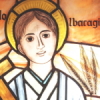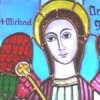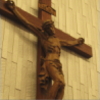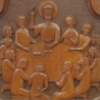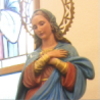説教
“Lord, it is good that we are here with you.”
A monthly meditation on the Transfiguration of the Lord
On August the 6th
St. Mark’s Gospel 9:2-10
Fr. John S. Satoru Kato
“Lord, it is good that we are here with you.” (St. Mark’s Gospel 9:5)
These are the words that Peter with James and John told Jesus, the Christ, after seeing that Jesus had been transfigured before them and his clothes had become radiant, intensely white, as the Gospel tells us.
St. Mark in his same Gospel reports the story of the Transfiguration of Jesus almost immediately after Jesus’ following words (Mark 8:31):
“The Son of Man (that is Jesus himself) must suffer many things and be rejected by the elders and the chief priests and the scribes and be killed, and after three days rise again.”
Now, back to the Transfiguration of Jesus, St. Mark tells us, “Jesus took with him Peter, James and John, and led them up a high mountain by themselves. And he was transfigured before them, and his clothes became radiant, intensely white, as no one on earth could bleach them”. (9:2-3)
Then, St. Mark continues as follows: “And there appeared to them Elijah with Moses, and they were talking with Jesus”. (9:4)
What were Elijah and Moses, the two of the most important figures out of the Biblical religion before Jesus, talking about with Jesus in the centre?
Without mentioning any about the details of their conversation, St. Mark continues to tell: “A voice came out of the cloud, ‘This is my beloved Son; listen to him.’” (8:7)
Very fortunately, however, we can learn from St. Luke of the details of their conversation of Elijah and Moses with Jesus himself in his Gospel as follows:
“Elijah and Moses, who appeared in glory, spoke with Jesus of his departure, which he was about to accomplish at Jerusalem”. (St. Luke 9:31)
Indeed, immediately after the Transfiguration of Jesus had been taken place, Jesus was about to make his last journey to Jerusalem with his twelve disciples. Just before this, however, as reported by St. Mark, God the Father himself, through the voice out from the heavens, made them realized that Jesus, who was about to suffer, even on the cross, at Jerusalem was/is the Christ the Lord, the only Son of God the Father in the heavens.
It is now crystal clear that Jesus is the Son of God. Then, what does Jesus’ departure, which he was to accomplish at Jerusalem, means?
In his original Greek text, St. Luke uses the word έξοδος (exodus) for ‘departure’ in English and the Greek word έξοδος (exodus) means “Passover”.
Now, it becomes clear that what Jesus was about to accomplish at Jerusalem was to accomplish his Passover with his disciples and for them.
However, Jesus’ Passover, that is ‘his passing over’, from where to where?
The answer must be obvious. The έξοδος / Passover of Jesus with his twelve disciples, then and now with us, is his ‘Passing over’ from this world to the Kingdom of God, that is, his own Kingdom!
For accomplishing of his έξοδος / Passover, Jesus, even the Son of God, came down to us from his heavens. Indeed, for this, Jesus came to us and made us his disciples, then finally he would take us up with him to his own Kingdom.
Where is now this έξοδος / Passover of Jesus to be taken place? And where can now we participate in this έξοδος / Passover of Jesus with him as his disciples?
That is surely at the Mass / the Holy Eucharist in the Catholic Church, where and when Jesus, the Risen Lord himself, is in the form of the Blessed sacraments. He is ready to give up himself as a sacrifice for us and to give him to all of us in the Blessed sacraments.
In the name of the Father and of the Son and of the Holy Spirit. Amen.

